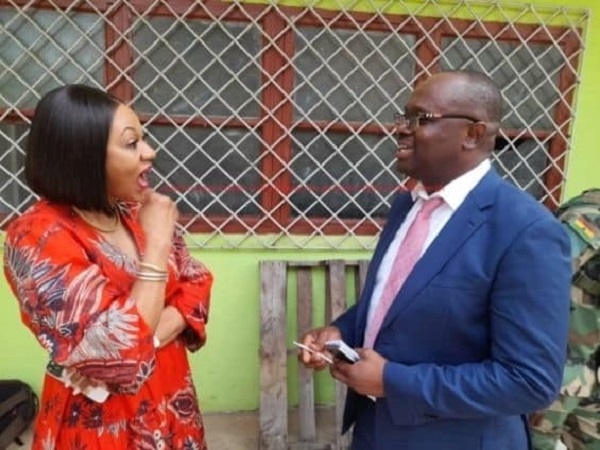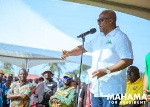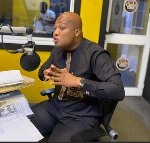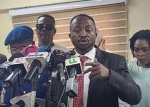NDC’s call for forensic audit of voter register over alleged irregularities intensifies
 EC's chairperson , Jean Mensa and Rd Edward Omane Boamah
EC's chairperson , Jean Mensa and Rd Edward Omane Boamah
The main opposition National Democratic Congress (NDC) has intensified its call for a forensic audit of the voters’ register, citing significant irregularities and discrepancies in the 2020, 2023, and 2024 registers.
The NDC recently engaged the Electoral Commission (EC) in discussions over what they termed an "unfit-for-purpose" voters' register and has demanded immediate corrective measures through a forensic audit.
The Director of Elections and IT in a statement dated Saturday, September 7, 2024, Dr Edward Omane Bomah explained that its key observations from the Voter Register analysis show that:
· 243,540 Previous Transfers Illegally Added: There are allegations that 243,540 previous voter transfers were illegally added to the 2024 transfers, including repeated entries of transferred names.
· 15,000+ Unidentifiable Voter Transfer Paths: Over 15,000 voter transfer paths cannot be identified, raising suspicions of fake voter registrations and prompting questions about the original registration locations of these voters.
· 3,957 Voters Missing: Nearly 4,000 voters listed in the 2023 register are missing from the 2024 provisional register due to transfers.
· 2,094 Voter Transfers Not Accounted For: Some 2,094 voters were transferred to different polling stations but were not listed in the Absent Voter List as required by law.
· Corrupted Files: Several files containing names and photos of registered voters are reportedly corrupted, which could cause significant disruptions on election day.
The NDC emphasized that these findings only represent the "tip of the iceberg" and suggested that the root causes of these irregularities are evident to those with technical knowledge.
Why a Forensic Audit is Necessary
The NDC argued that a forensic audit is essential to address several key concerns:
1. Extent of Manipulation: The audit would help determine the full extent of illegal voter transfers and quantify how many voters have been affected nationwide.
2. System Vulnerabilities: The audit could identify specific vulnerabilities within the EC's systems – both human and technical – that allowed unauthorized transfers and determine if current measures are sufficient to prevent future incidents.
3. Timeliness of the Provisional Register: An audit would clarify the reasons behind the delay in providing the Provisional Voters Register to the opposition National Democratic Congress (NDC).
4. Impact on Elections: The group seeks to understand how these errors could affect the fairness of the upcoming elections and whether they might compromise the integrity of the results.
5. Historical Comparisons: An audit could assess the relevance of the EC's references to mistakes made by past commissions and identify lessons that could prevent similar issues in the future.
6. Timeline for Corrections: The NDC emphasized the need for a clear timeline to address these irregularities to ensure a reliable and credible voter register before the printing of ballots and other materials begins.
According to the NDC, to ensure the credibility of the electoral process, it’s also requesting a five-day re-exhibition of the voter register following the forensic audit.
This step would allow all legitimate voters to verify the accuracy and integrity of their information before the general election.
They urged the Electoral Commission to convene an emergency meeting with all political parties, civil society organizations, and members of the diplomatic community, including representatives from ECOWAS, the AU, UNDP, EU, USAID, DANIDA, and The British High Commission, to discuss these concerns and proceed with the forensic audit.
The NDC stressed that the credibility of Ghana's democratic process depends on the integrity of its electoral institutions.
They further called on the Electoral Commission to uphold the highest standards of fairness, neutrality, and transparency in the upcoming 2024 elections.
They also assured the Commission that their criticisms are not meant to undermine its authority but rather to promote accountability and safeguard the integrity of Ghana's democracy.
Source: Classfmonline.com/Cecil Mensah
Trending News

GFL calls for state of emergency over galamsey menace
10:32
I’m personally against calls for ban on small-scale mining – Mireku Duker
12:01
Mahama pledges comprehensive audit of public funds and recovery of ‘looted’ cash if NDC wins
08:24
Release additional funds for tuition, stipends – Ghanaian students abroad plead with Akufo-Addo
01:37
Mahama rates Kufuor above Akufo-Addo, calls for NDC victory to rescue Ghana
10:06
Deploy full security in the fight against galamsey – GPCC
12:08
Galamsey fight: Declaring state of emergency very ‘draconian’ measure – Lands Minister
07:43
Oyarifa Homowo: Four arrested in connection with machete attack
01:40
Ablakwa reveals how Akufo-Addo's family renovated stadia has led to CAF ban, depsite huge expenditure
15:42
NLC, GAP withdraw from Dec. 7 polls certification issues and voter Concerns
09:26




